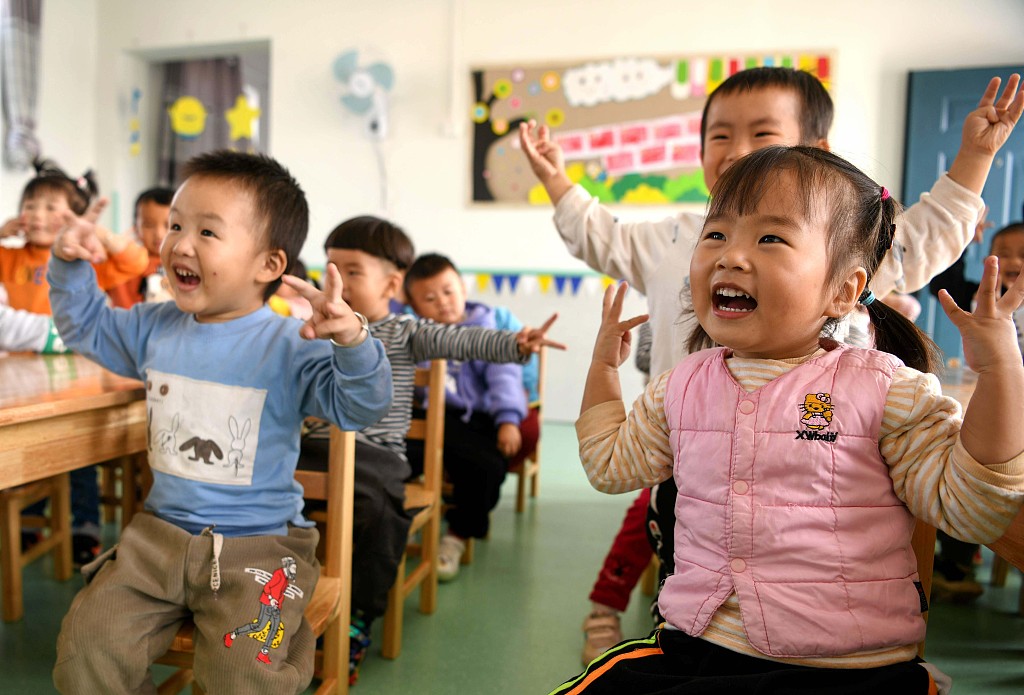Lower enrollments a blow to kindergartens
China Daily | Updated: 2023-12-22 09:43

More vacancies a challenge to survival and development of private facilities
On Aug 31, Keke's parents took her to a public kindergarten in the Gongshu district of Hangzhou, Zhejiang province. On the same day, her name also appeared on the admission list of a private kindergarten in the district. The family eventually picked the public one.
"It's fortunate we have access to this public kindergarten, enabling us to pay a tuition fee of around 5,000 yuan ($700) for a semester rather than around 5,000 yuan for a month," Keke's mother said.
"Our neighbor told us that her kid failed to get access to this public kindergarten for two consecutive years, so we also applied for the private one to ensure Keke found a place."
Keke is one of the children who have benefited from a drop in preschool enrollment. However, experts said having more vacancies available has also posed a challenge to the survival and development of kindergartens, especially small and medium-sized private ones.
Last year, there were 289,200 kindergartens across the country, a year-on-year decrease of 1.9 percent, marking the first decline in a decade. The number of children enrolled in preschool education was 46.3 million, a year-on-year decrease of 3.7 percent, continuing the downward trend from 2021, according to figures from the Ministry of Education.
Six private kindergartens in Gongshu district with no students or teaching activities are expected to shut down after the expiration of their operating licenses, the district's education bureau said in October.
A notice issued by the Hunan Provincial Department of Education on Nov 29 made Hunan the first province to propose a provincial-level adjustment of kindergarten arrangements with the objective of promoting their organized establishment, transformation and closure.
Hunan proposed constructing, expanding or renovating public kindergartens in urban areas with concentrated populations, suspending additions in rural areas, and guiding the merger or closure of those with poor education quality and few children.
Yu Xueping, head of the No 1 Jiangsu Provincial Government Offices Kindergarten, attributed the declining number of kindergartens and enrolled children to the low birthrate.
Data from the National Health Commission showed that China had 9.56 million newborns last year, a drop of 10 percent year-on-year. The country's total population decreased by 850,000, marking the first decline this century as a result of the accumulated effect of low fertility levels.
The overall fertility rate — the average number of children born to each woman of reproductive age — dropped to 1.09 last year, the lowest in countries with a population over 100 million, according to a report published by the China Population and Development Research Center.
However, Yu said that as a well-known public kindergarten specializing in language development and game teaching, enrollment at her kindergarten was not affected and even saw a slight increase, but it has no plans to expand.
"With limited space, it's hard to add more classes while maintaining the teaching quality," Yu said.
Yu said that the minimum age for admission dropped from 18 months to 6 months this year, and the kindergarten plans to propel the integrated development of nursery and kindergarten education to alleviate parents' pressure in raising young children, to share existing infrastructure and teaching resources and to generate additional revenue.
Wang Haiying, director of the Preschool Education Policy Research Center at Nanjing Normal University, said that integrating nursery and kindergarten education is a key focus for many kindergartens in China. However, the primary challenge lies in clarification and unification of management bodies.
In China, the National Health Commission oversees child care services for children aged 0-3 years, while the Ministry of Education is responsible for preschool education for children aged 3-6 years.
Wang said early childhood education needed to be under a unified framework with one regulator behind the steering wheel to avoid coordination problems.
"Preschool education is market-oriented in nature, as the basic public education system only covers a little part of it compared with compulsory education," Wang said.
As the birthrate drop hit private kindergartens hardest, Wang said preferential policies should be given to private ones to guarantee healthy competition.
Wang proposed permitting early enrollment in small private kindergartens that meet teaching standards, and establishing control over the number of children admitted to public ones to ensure the normal operation of more kindergartens.
























